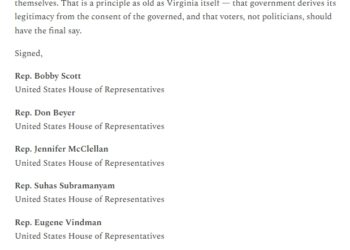 In typical fashion, the Virginia legislature has once again failed to make a decision, this time on filling vacancies on the state Supreme Court. This latest inability to do the job for which legislators were elected comes on the heels of their refusal to resolve how to redistrict Virginia’s congressional districts, a biennial budget “balanced” by borrowing from the future, and a “transportation plan” based upon debt and wishful thinking.
In typical fashion, the Virginia legislature has once again failed to make a decision, this time on filling vacancies on the state Supreme Court. This latest inability to do the job for which legislators were elected comes on the heels of their refusal to resolve how to redistrict Virginia’s congressional districts, a biennial budget “balanced” by borrowing from the future, and a “transportation plan” based upon debt and wishful thinking.
In this latest brouhaha, it seems that the boys and girls on both sides of the aisle in Richmond can agree on two judges to elevate from the Court of Appeals to the state’s highest court, but, alas, then they have two more vacancies to fill. Ah, that’s the rub. The Democrats in the senate reasonably argue that each party should be able to nominate an equal number of judges. The no-compromise Republicans in the house, however, insist that they should have the right to name three out of four of the new judges.
It’s not just the top court and the appeals court that are in limbo because of a legislative failure-to-communicate. The General Assembly also failed to fill 10 other judgeships, six in circuit courts and four in general and juvenile and domestic relations courts. Bob McDonnell can name interim judges until January when the General Assembly reconvenes, but that makes absolutely no sense. The state’s courts should not have temporary judges for just a few months, as if they were substitute teachers or fill-in workers. No, what we need is a legislature that can work together, compromise and put aside rabid partisanship that causes gridlock.
The time has come for a change in the way judges are chosen in Virginia, especially if our representatives can’t do the job they were elected to do. One suggestion might be for the Virginia bar to nominate four persons for each judgeship that is open. Then, the legislature would have to select a person from that list. Instead, I am sure when they return in January that job will be given yet again to a small group of people from the house and senate courts of justice committees who will then cut a deal in a back room. After all, that’s how the state budget is always determined and the way the impasse over redistricting will ultimately be resolved. That’s become the model for democracy, Virginia-style. Harry Byrd would be proud.

![[UPDATED with Official Announcement] Audio: VA Del. Dan Helmer Says He’s Running for Congress in the Newly Drawn VA07, Has “the endorsement of 40 [House of Delegates] colleagues”](https://bluevirginia.us/wp-content/uploads/2026/02/helmermontage.jpg)
















